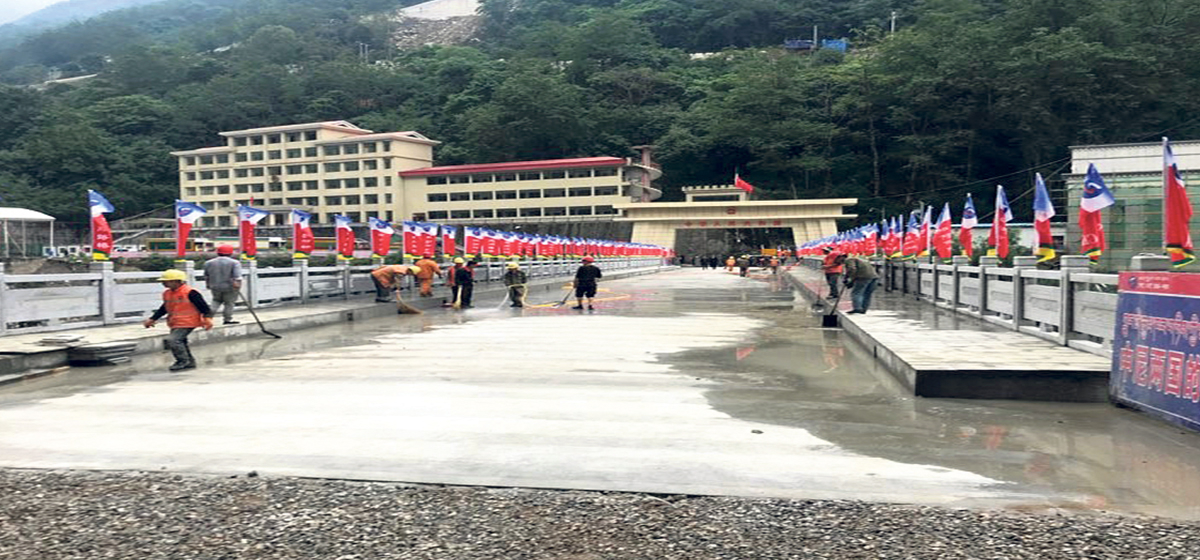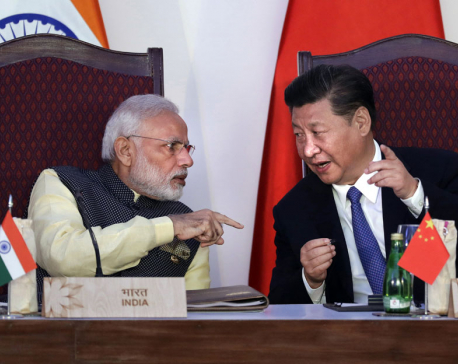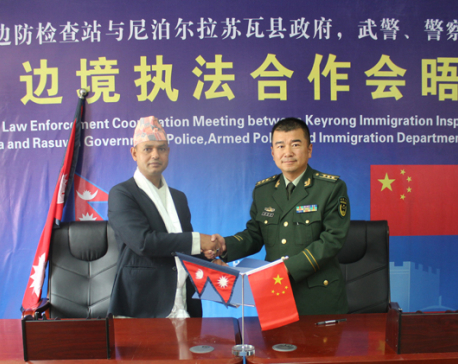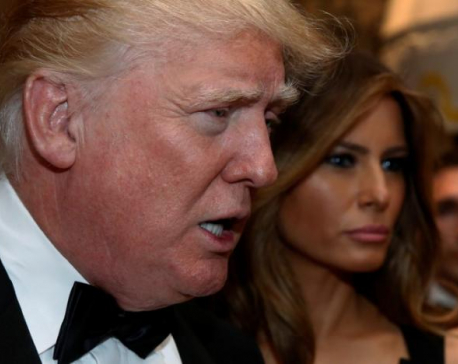
OR
When will the undeclared Chinese blockade end?
Published On: September 26, 2022 02:05 PM NPT By: RAJESH KHANAL

China is just clearing the Nepal-bound cargo containers stuck at the border, but is least bothered about barrier-free movement for Nepali traders
KATHMANDU, Sept 26: Despite receiving assurance from both Nepali and Chinese authorities, Nepali traders based on China-imported goods via land routes have suffered due to the disruption of bilateral trade from the Chinese side time and again for the past several years.
For the past several years, China has imposed an “undeclared blockade” on Nepal by halting the free movement of goods into the landlocked country via both Tatopani-Khasa and Rasuwagadhi-Kerung transit points. The obstruction came to limelight after the mega earthquake of 2015 jolted the country while it became more apparent after the spread of coronavirus from the beginning of 2020.
Although Nepali traders have been raising their concerns over the period, they have just received assurances at different government levels to resolve the problems “soon”.
Until last week, over 500 cargo containers were reported to remain stuck at these two border points with China. The Nepal-bound cargo trucks are carrying Chinese products targeted for the Dashain and Tihar, the biggest festivals of Nepali Hindus, apart from the goods for the approaching winter season.
The Chinese restriction has taken its toll even on Nepal's exports to its northern neighbor in the past two years, show the records maintained by the Department of Customs. Nepal’s exports to China declined to Rs 808.75 million in the fiscal year 2021/22, down from Rs 1.016 billion in the fiscal year 2020/21. However, the imports from China increased by 13 percent to Rs 264.78 billion in the last year.
After going through a series of bilateral talks, the Chinese side just showed pity and helped clear the Nepali containers on their land. But, they showed little concern over removing the hurdles forever. Traders said Nepal barely made any export via the two major trade routes to China for the past one year due to the problems created at the Nepal-China borders.
In the virtual meeting of the joint-secretary level between the two countries on Monday, too, the Chinese authorities expressed that they had cleared the way only temporarily. “While we requested the Chinese side to allow barrier-free movement across the borders throughout the year, they reiterated the concern over the poor precaution measures adopted by Nepal to contain coronavirus,” said a high-level government official who participated in Monday's meeting.
A former secretary at the Ministry of Industry, Commerce and Supplies said China has been imposing a unilateral decision on whether or not to allow the movement of Nepal-bound products through these land routes. “The Chinese officials mostly twist the matter, blaming tiny factors, whenever Nepal tries to talk about providing easy access to their land for trade,” said the source, asking not to be named.
While traders expressed their grievances, both Finance Minister Janardan Sharma and Minister for Foreign Affairs Narayan Khadka reiterated their commitments to hold talks with high level Chinese authorities and request them to open the major gateways of bilateral trade.
Likewise, Li Zhanshu, chairman of the Standing Committee of the National People’s Congress of the People’s Republic of China, during his visit to Nepal also assured the Nepali side that they would ‘clear all containers’ bound to Nepal before the festive season in Nepal. However, he, too, did not give his word to open the borders for undisrupted movement of cargo containers as it used to be in the past. This has put the traders in a bigger dilemma about the future of bilateral trade via land routes.
Ashok Shrestha, president of Nepal Trans-Himalayan Border Commerce Association, said they were importing an average of seven containers of goods on a daily basis from the Rasuwagadhi-Kerung transit point for the past one year. According to him, traders are allowed to receive the goods transported by Chinese trucks only after they arrive on the Nepali land.
China has been citing the spread of coronavirus for the disruption of bilateral trade at the borders in recent times. However, they have been creating hurdles for the past seven years, Nepali traders say.
Hom Bahadur Basnet, president of Sindhupalchok Chambers of Commerce and Industry, said China has been disrupting trade through the Tatopani-Khasa border point after the 2015 earthquake. “Since then, the Chinese authorities hardly allow a dozen containers per day to cross the border,” said Basnet, adding that the figure used to stand at around 200 containers before the earthquake.
You May Like This

India and China face off in border standoff
NEW DELHI, July 25: It was the tiny Himalayan kingdom of Bhutan that sounded the alarm: Chinese soldiers had arrived... Read More...

Nepal, China seal border security deal
KATHMANDU, July 7: The Nepal government and China government have agreed to establish Nepal-China Border Law Enforcement Cooperation (Keyrong) Joint... Read More...

Chinese state tabloid warns Trump, end one China policy and China will take revenge
SHANGHAI/TAIPEI, Jan 9: State-run Chinese tabloid Global Times warned U.S. President-elect Donald Trump that China would "take revenge" if he reneged... Read More...










Just In
- NRB introduces cautiously flexible measures to address ongoing slowdown in various economic sectors
- Forced Covid-19 cremations: is it too late for redemption?
- NRB to provide collateral-free loans to foreign employment seekers
- NEB to publish Grade 12 results next week
- Body handover begins; Relatives remain dissatisfied with insurance, compensation amount
- NC defers its plan to join Koshi govt
- NRB to review microfinance loan interest rate
- 134 dead in floods and landslides since onset of monsoon this year








Leave A Comment